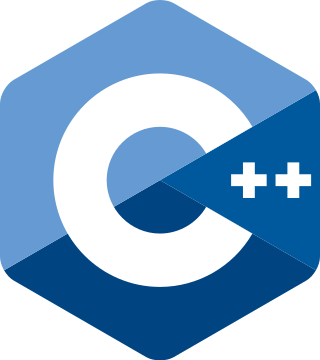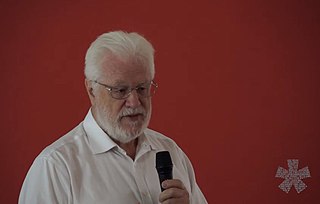
Bjarne Stroustrup is a Danish computer scientist, most notable for the invention and development of the C++ programming language. As of July 2022, Stroustrup is a professor of Computer Science at Columbia University.

C++ is a high-level general-purpose programming language created by Danish computer scientist Bjarne Stroustrup as an extension of the C programming language, or "C with Classes". The language has expanded significantly over time, and modern C++ now has object-oriented, generic, and functional features in addition to facilities for low-level memory manipulation. It is almost always implemented as a compiled language, and many vendors provide C++ compilers, including the Free Software Foundation, LLVM, Microsoft, Intel, Embarcadero, Oracle, and IBM, so it is available on many platforms.
The Standard Template Library (STL) is a software library originally designed by Alexander Stepanov for the C++ programming language that influenced many parts of the C++ Standard Library. It provides four components called algorithms, containers, functions, and iterators.

Tom Gilb is an American systems engineer, consultant, and author, known for the development of software metrics, software inspection, and evolutionary processes.
Resource acquisition is initialization (RAII) is a programming idiom used in several object-oriented, statically-typed programming languages to describe a particular language behavior. In RAII, holding a resource is a class invariant, and is tied to object lifetime. Resource allocation is done during object creation, by the constructor, while resource deallocation (release) is done during object destruction, by the destructor. In other words, resource acquisition must succeed for initialization to succeed. Thus the resource is guaranteed to be held between when initialization finishes and finalization starts, and to be held only when the object is alive. Thus if there are no object leaks, there are no resource leaks.
C/C++ Users Journal was a computer magazine dedicated to the C and C++ programming languages published in the United States from 1985 to 2006. It was one of the last printed magazines to cover specifically this topic. It was based in Lawrence, Kansas.
C++/CLI is a variant of the C++ programming language, modified for Common Language Infrastructure. It has been part of Visual Studio 2005 and later, and provides interoperability with other .NET languages such as C#. Microsoft created C++/CLI to supersede Managed Extensions for C++. In December 2005, Ecma International published C++/CLI specifications as the ECMA-372 standard.
David Abrahams is a computer programmer and author. He is the son of physicist Elihu Abrahams and choreographer Geulah Abrahams. He is most well known for his activities related to the C++ programming language. In particular his contributions to the language include the delineating of a theory of exceptions, sitting on the C++ Standards Committee, being a founding member of Boost and co-authoring a book on the subject of template metaprogramming.
Kevlin Henney is an English author, presenter, and consultant on software development. He has written on the subject of computer programming and development practice for many magazines and sites, including Better Software, The Register, C/C++ Users Journal, Application Development Advisor, JavaSpektrum, C++ Report, Java Report, EXE, and Overload. He is a member of the IEEE Software Advisory Board. Henney is also coauthor of books on patterns and editor of 97 Things Every Programmer Should Know.
The rule of three and rule of five are rules of thumb in C++ for the building of exception-safe code and for formalizing rules on resource management. The rules prescribe how the default members of a class should be used to achieve these goals systematically.

AntiPatterns: Refactoring Software, Architectures, and Projects in Crisis is a book about anti-patterns: specific repeated practices in software architecture, software design and software project management that initially appear to be beneficial, but ultimately result in bad consequences that outweigh hoped-for advantages. This study covers several recurring problematic software-related patterns, the forces that inspire their repeated adoption, and proven-in-practice remedial actions, called refactored solutions. The authors are William Brown, Raphael Malveau, Skip McCormick, and Tom Mowbray; with Scott Thomas joining in on second and third books. Four of the five authors worked together at Mitre Corporation in the late 1990s.
Scott W. Ambler is a Canadian software engineer, consultant and author. He is an author of books about the Disciplined Agile Delivery toolkit, the Unified process, Agile software development, the Unified Modeling Language, and Capability Maturity Model (CMM) development.
ACCU, previously known as the Association of C and C++ Users, is a non-profit user group of people interested in software development, dedicated to raising the standard of computer programming. The ACCU publishes two journals and organizes an annual conference.
In C++ computer programming, allocators are a component of the C++ Standard Library. The standard library provides several data structures, such as list and set, commonly referred to as containers. A common trait among these containers is their ability to change size during the execution of the program. To achieve this, some form of dynamic memory allocation is usually required. Allocators handle all the requests for allocation and deallocation of memory for a given container. The C++ Standard Library provides general-purpose allocators that are used by default, however, custom allocators may also be supplied by the programmer.
Concepts are an extension to the templates feature provided by the C++ programming language. Concepts are named Boolean predicates on template parameters, evaluated at compile time. A concept may be associated with a template, in which case it serves as a constraint: it limits the set of arguments that are accepted as template parameters.
In the C++ programming language, decltype is a keyword used to query the type of an expression. Introduced in C++11, its primary intended use is in generic programming, where it is often difficult, or even impossible, to express types that depend on template parameters.
.EXE Magazine was a monthly computer software magazine published in the United Kingdom from 1986 to 2000.
The Dr. Dobb's Excellence in Programming Award was an annual prize given to individuals who, in the opinion of the editors of Dr. Dobb's Journal, "made significant contributions to the advancement of software development." The Excellence in Programming Award includes a $1,000 prize that was donated in the award winner's name to a charity of the winner's choice. The award was launched in 1995 in the print edition of Dr. Dobb's Journal and was given each year until 2009. In his March 1995 article introducing the awards, then editor-in-chief Jonathan Erickson wrote that the award was intended to recognize "achievement and excellence in the field of computer programming." Erickson explained that the winners were "selected by a special editorial committee" of the magazine. Because Dr. Dobb's serves an audience of software developers, the Excellence in Programming Award is specifically intended to recognize resources for programmers: languages, code libraries, tutorial books, and so on. Developers of shrinkwrap software intended for retail sale, custom software for corporate use, embedded software, or general-purpose applications were not considered for the award.
The following outline is provided as an overview of and topical guide to C++:




